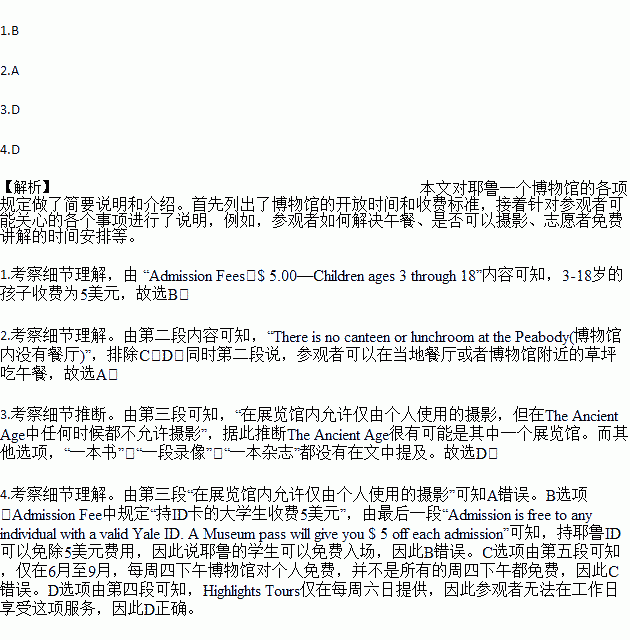题目内容
The Yale Peabody Museum is open:
Monday through Saturday 10:00 am to 5:00 pm
Sunday noon to 5:00 pm
The Museum is closed on New Year’s Day,Easter Sunday, Independence Day,Thanksgiving Day, Christmas Eve, and Christmas Day.
Admission Fees:
$ 9.00—Adults
$ 8.00—Senior citizens 65 years and over
$ 5.00—Children ages 3 through 18, and college students with ID
$ 4.00—Group admission
To receive this reduced admission, groups must make a reservation at least 2 weekdays in advance.
More attention:
Some halls may be closed to the public on weekday mornings for school group programs, so we recommend visiting after 1 pm on weekdays or at any time on the weekends.
There is no canteen or lunchroom at the Peabody. Information on local eating places is available through our Restaurant Guide. Visitors are welcome to picnic on the lawns (草坪) around the Museum,
Photography with handheld cameras is permitted in exhibition halls for personal use only; photography in The Ancient Age is prohibited (禁止) at all times.
Highlights Tours of the Museum are offered every Saturday and Sunday at 12:30 and 1:30 pm. These 45-minute tours of the Yale Peabody Museum’s exhibition halls are led by one of our specially trained volunteer guides.
The Museum offers free individual admission on Thursday afternoons from 2:00 to 5:00 pm during the months of September to June.
Admission is free to any individual with a valid Yale ID. Check out a Peabody Museum pass at your local library. A Museum pass will give you $ 5 off each admission for up to 4 people. Ask for it at your local library.
1.How much should a 12-year-old six-grader pay to visit the museum?
A. 4 dollars. B. 5 dollars.
C. 8 dollars. D. 9 dollars.
2.Visitors are allowed to have lunch .
A. outside the museum B. in any hall of the museum
C. in the canteen of the museum D. in the lunchroom of the museum
3.The Ancient Age in the museum is most probably
A. a book B. a magazine
C. a video D. an exhibition hall
4.What can we learn from the text?
A. Photography is not allowed in exhibition halls.
B. Even Yale students have to pay to visit the Museum.
C. Visitors can enjoy free admission every Thursday Afternoon.
D. Visitors can’t enjoy Highlights Tours of the Museum on weekdays.
 津桥教育计算小状元系列答案
津桥教育计算小状元系列答案| A. | shouldn't | B. | mustn't | C. | wouldn't | D. | couldn't |
| A. | stand the boy | B. | stands the boy | ||
| C. | does the boy stand | D. | the boy stands |

